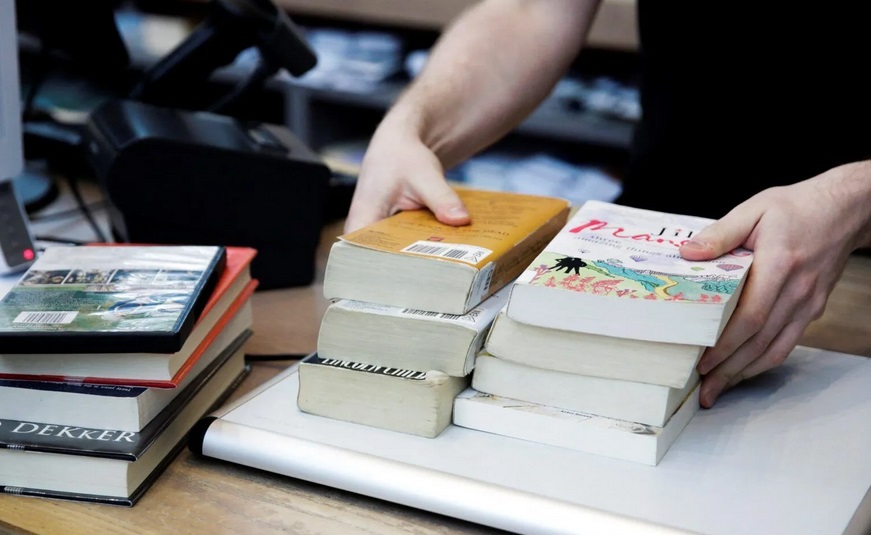Every summer, my family made a much-anticipated weekly trip to the local public library to check on our progress in the summer reading program. The librarians would open a treasure chest of prizes to reward us for the hours we spent reading the previous week, always by the end of the week.
23 August 2024

A librarian checks out books at a library in Seattle, Washington, in a file photo. (OSV News photo/Jason Redmond, Reuters)
By Cecilia Cicone
Every summer, my family would make a much-anticipated weekly trip to the local public library to check on our progress in the summer reading program. The librarians would open a treasure chest of prizes to reward us for the hours we spent reading the week before. At the end of the summer, there were always prizes like free ice cream or tickets to see the local minor league baseball team.
Whether you fondly remember hitting reading goals to earn a pizza for yourself or you’re now working with your kids to read 1,000 books before kindergarten, initiatives that encourage a love of reading in children have long been a part of American life. Especially in our current age of shortened attention spans, the sheer discipline of sitting down and reading a book is a virtue in itself.
In a letter published on Sunday, August 4, Pope Francis addressed those involved in priestly formation in particular, but also to all Christians in general, to encourage us to read more literature and poetry and to include them in formation programs (see HERALD, August 18 – front page).
Pope Francis writes that, based on his own experience as a literature teacher, it is natural to think that Christians need to read the classics above all else in order to develop a refined sense of truth and beauty. And while these are important, he says, we need to read more than just Homer or Hamlet in our Christian education.
The Holy Father encourages us to engage with contemporary literature in order to be a Church in dialogue with our culture. He reiterates his message that we must be Christians who understand our brothers and sisters who may not share our moral values but are nevertheless loved by Christ.
When I read Pope Francis’ short letter, it touched me deeply. As a reader and writer, I enjoy writing reviews of secular books from a Catholic perspective, not only to warn about the content or to glean Christian messages from new releases, but also to see where authors are vulnerable enough to reveal the cry of the human heart.
Reading books by authors who hold different values or views than we do is a relatively safe way to learn about the workings of a secular culture. Unlike walking into a crowded nightclub on a Saturday night, or even following people we disagree with on social media, there is no immediate need for action. We don’t have to worry about saying the wrong thing to someone, or that our silence might be interpreted as agreement.
When we read, we can be a listening church without having to react immediately. When we hear the cry of humanity in literature, we can allow our hearts to be moved, as Jesus did when he saw the crowds “weary and helpless, like sheep without a shepherd” (Mt 9:36).
Literature gives us the freedom to recognize how we respond, not just with words or posts, but with the way we live our lives and love our brothers and sisters. Books give us insight into complex situations and suffering, the places where God’s presence is often most clearly visible, in a way that might never be possible otherwise.
Of course, we must always be cautious in our use of media, and books are no exception. There is no need to read books that are pornographic or that could be an occasion for us to sin, a boundary that each individual must honestly recognize for themselves. For example, I enjoy reading thrillers, but I personally try to avoid books with supernatural elements because I have realized that they disturb my inner peace. Another person might be disturbed by the violence in some of the books I read, but for me, they are just elements of a story. It is always a good idea to ask the Holy Spirit for guidance, and the choice of media we consume is no exception.
I am grateful for the Holy Father’s recent letter encouraging us to include literature in our Christian formation. It also reminds us that books have a clearly defined beginning and end, unlike social media, which can endlessly consume our time. Whether it’s a hardback, e-book, or audiobook, pick up a book today. You may be surprised at what you find. –OSV
(Cecilia Cicone is a writer and communicator working in the diocesan ministry in northwest Indiana, USA.)
